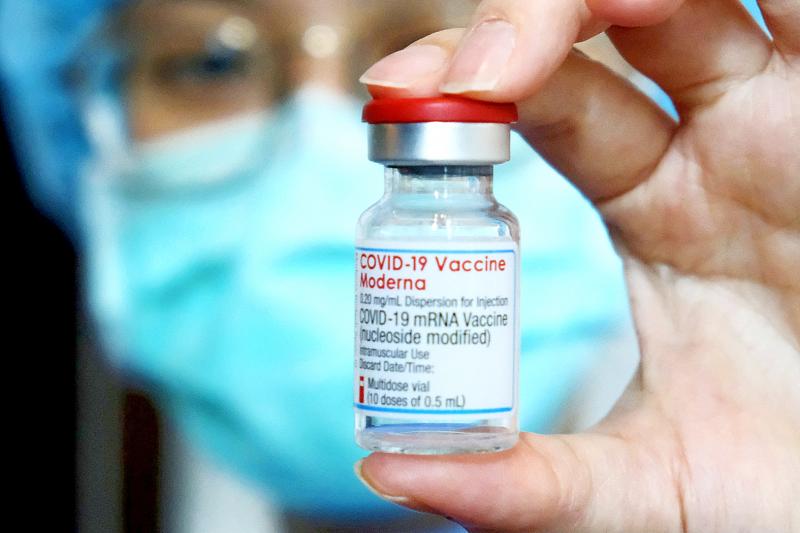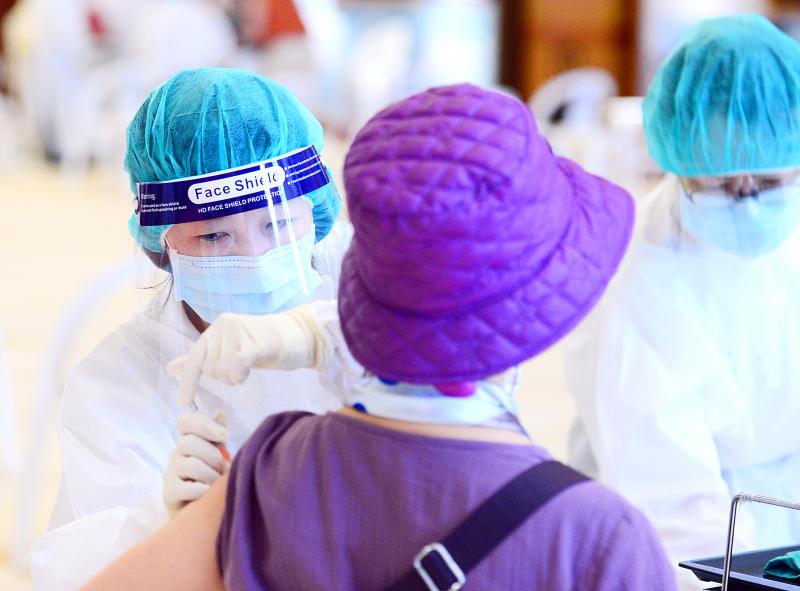The US was yesterday to ship 2.5 million COVID-19 vaccine doses to Taiwan, a senior US administration official told Reuters, more than tripling Washington’s previous allocation of shots for the nation.
Washington, competing with Beijing to deepen geopolitical clout through so-called “vaccine diplomacy,” had initially promised to donate 750,000 doses to Taiwan, but is increasing that number as US President Joe Biden’s administration advances its pledge to send 80 million US-made shots around the world.
The 2.5 million donated doses of the Moderna Inc vaccine would leave Memphis, Tennessee, on a flight belonging to Taiwan’s national carrier, China Airlines Ltd (中華航空), early yesterday and arrive in Taipei this evening, the senior US administration official said, adding that the prompt delivery was due to experts from both sides being able to work out regulatory issues.

Photo: Sam Yeh, AFP
Earlier in Taipei, asked by reporters about the donation, as well as reports that a separate shipment of Moderna shots purchased by the government would arrive in Taiwan today, Minister of Health and Welfare Chen Shih-chung (陳時中) said: “I cannot confirm this at this time... I will report it as soon as everything is absolutely certain.”
The US official said: “We are not allocating these doses, or delivering these doses, based on political or economic conditions. We are donating these vaccines with the singular objective of saving lives.”
“Our vaccines do not come with strings attached,” the official said, adding that Taiwan had “faced unfair challenges in its efforts to acquire vaccines on the global marketplace.”

Photo: Wang Yi-sung, Taipei Times
A deal for the nation to purchase vaccines from Germany’s BioNTech SE fell through this year, with the government blaming pressure from Beijing.
China has denied the accusation, saying Taiwan is free to obtain the vaccines through Shanghai Fosun Pharmaceutical Group Co Ltd (上海復星醫藥集團), which has a contract to sell BioNTech’s vaccine in China, Hong Kong, Macau and Taiwan.
“We believe that these attempts by China to block purchases, for political purposes, are reprehensible,” the senior Biden administration official said.
The American Institute in Taiwan confirmed the donation in a Facebook post last night, saying that it "looks forward to the arrival in Taiwan tomorrow of 2.5 million doses of Moderna vaccine donated by the U.S. government."
In related news, people who received a first dose of the AstraZeneca COVID-19 vaccine before May 9 would be eligible for a second shot starting on Wednesday, the Central Epidemic Command Center (CECC) said yesterday.
As of Friday, about 27,000 people had received both doses of the AstraZeneca vaccine in Taiwan, said Chen, who heads the center.
Starting on Wednesday, more doses of the vaccine would be delivered to local governments, allowing people who received a first dose of the vaccine before May 9 to get their second dose, he said.
Eligibility covers people who received the first dose under a government-funded program and those who paid for it, for an estimated 67,000 people in total, CECC data showed.
Clinical trials have shown that the AstraZeneca vaccine’s efficacy is about 71 percent at 22 days after the first dose, and could increase to 81 percent when the interval between the two doses is 12 weeks, the center said.
It urged people who received their first dose to get their second dose after 10 to 12 weeks, citing the Advisory Committee on Immunization Practices.
Several cases of sudden death have been reported among elderly people following vaccination since Monday, when the AstraZeneca vaccine became available for people aged 75 or above.
Chen said 49 people aged 75 or older suddenly died following vaccination.
Preliminary autopsy results on four of the deceased showed that they died of cardiovascular disease, including atherosclerosis, myocardial infarction, and ruptured aortic aneurysm, he said.
The CECC would continue to examine whether there were causal links between the deaths and COVID-19 vaccination, he added.
People with acute illness or unstable chronic health conditions should wait for their condition to stabilize before getting a shot, Chen said.
Those going to a vaccination site to receive a COVID-19 shot should stay hydrated and avoid staying under the sun for too long, he added.
Additional reporting by Lee I-chia

ENDEAVOR MANTA: The ship is programmed to automatically return to its designated home port and would self-destruct if seized by another party The Endeavor Manta, Taiwan’s first military-specification uncrewed surface vehicle (USV) tailor-made to operate in the Taiwan Strait in a bid to bolster the nation’s asymmetric combat capabilities made its first appearance at Kaohsiung’s Singda Harbor yesterday. Taking inspiration from Ukraine’s navy, which is using USVs to force Russia’s Black Sea fleet to take shelter within its own ports, CSBC Taiwan (台灣國際造船) established a research and development unit on USVs last year, CSBC chairman Huang Cheng-hung (黃正弘) said. With the exception of the satellite guidance system and the outboard motors — which were purchased from foreign companies that were not affiliated with Chinese-funded

PERMIT REVOKED: The influencer at a news conference said the National Immigration Agency was infringing on human rights and persecuting Chinese spouses Chinese influencer “Yaya in Taiwan” (亞亞在台灣) yesterday evening voluntarily left Taiwan, despite saying yesterday morning that she had “no intention” of leaving after her residence permit was revoked over her comments on Taiwan being “unified” with China by military force. The Ministry of the Interior yesterday had said that it could forcibly deport the influencer at midnight, but was considering taking a more flexible approach and beginning procedures this morning. The influencer, whose given name is Liu Zhenya (劉振亞), departed on a 8:45pm flight from Taipei International Airport (Songshan airport) to Fuzhou, China. Liu held a news conference at the airport at 7pm,

AIR SUPPORT: The Ministry of National Defense thanked the US for the delivery, adding that it was an indicator of the White House’s commitment to the Taiwan Relations Act Deputy Minister of National Defense Po Horng-huei (柏鴻輝) and Representative to the US Alexander Yui on Friday attended a delivery ceremony for the first of Taiwan’s long-awaited 66 F-16C/D Block 70 jets at a Lockheed Martin Corp factory in Greenville, South Carolina. “We are so proud to be the global home of the F-16 and to support Taiwan’s air defense capabilities,” US Representative William Timmons wrote on X, alongside a photograph of Taiwanese and US officials at the event. The F-16C/D Block 70 jets Taiwan ordered have the same capabilities as aircraft that had been upgraded to F-16Vs. The batch of Lockheed Martin

GRIDLOCK: The National Fire Agency’s Special Search and Rescue team is on standby to travel to the countries to help out with the rescue effort A powerful earthquake rocked Myanmar and neighboring Thailand yesterday, killing at least three people in Bangkok and burying dozens when a high-rise building under construction collapsed. Footage shared on social media from Myanmar’s second-largest city showed widespread destruction, raising fears that many were trapped under the rubble or killed. The magnitude 7.7 earthquake, with an epicenter near Mandalay in Myanmar, struck at midday and was followed by a strong magnitude 6.4 aftershock. The extent of death, injury and destruction — especially in Myanmar, which is embroiled in a civil war and where information is tightly controlled at the best of times —